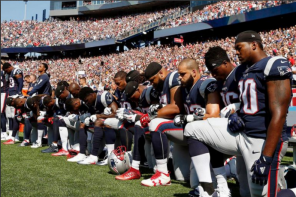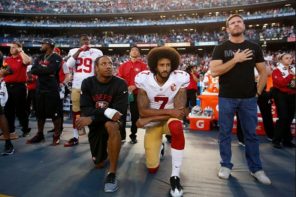In the last couple of weeks we have been rocked with scandals rooted in some of the worst offenses imaginable: the profanation of sacred trust placed in the protection of children and the disposition of the military dead. The Penn State scandal concerning sexual violence inflicted on young boys and the disturbing news from Dover Air Force base about the treatment of soldiers’ corpses are equally difficult to fathom but both tragically clear signs of corruption in the body politic.
In Shakespeare’s Hamlet, the line “There is something rotten in the state of Denmark” is uttered to signal the growing awareness that Denmark’s morality is in decline and crime is rotting the state from the inside. The Dover and Penn State controversies are still unfolding, but there is certainly something rotten in the state of America—something ominous lurking beneath all of the patriotic rhetoric about being God’s chosen nation and in the shadows of the glossy fantasy of Main Street USA.
Are these two shocking stories exceptional because they are the result of sick individuals who are so outside the norm they have nothing to do with everyday life in America? Or are they so exceptional because they point to patterns and impulses deeply ingrained in two of the most sacred, and hyper-masculine, institutions in American life: sports and the military?
Football and Power
On the one hand we have a story about sports—and in particular college football—at a school that is devoted to a historically accomplished team and with a community that reveres the coaches who have brought new forms of religious meaning, identity, and ritual to many fans/fanatics around the country. Indeed the sacred aura associated with this college team, and many others throughout the nation, is so strong, so powerful, and so lucrative, that other kinds of ethical considerations—about prioritizing education and fair recruitment practices, about caring for the health and welfare of college student athletes, about betraying the team when violations of moral principles and abuses of power are witnessed and reported—fall by the wayside.
The religious dimensions to this story are more complicated than the simplistic, though relevant, attention to the breakdown of ethical responsibility for those who conspired to cover up the vile and (allegedly) criminal activities of Jerry Sandusky, a pillar of the Penn State community. Sandusky and the other coaches at Penn State have been larger than life heroes to many, adored and idealized for one basic reason: the football team wins and inspires others to attend, support, trust, and identify with the university.
Football is both exceedingly violent, of course, yet also surprisingly intimate. Men’s bodies are up close and personal with other bodies on the field, in the locker room, and in the showers. Certain kinds of intimacy between bodies can often be religious and signal sacred bonds and ultimate commitments.
Football is about many things, but perhaps most central to the game is power, not simply in its crudest form but in more subtle and complicated ways. First is the collective power to defeat your opponent that emerges from bodies united by game plan and practice, each player knowing his role, and a more amorphous but critical team spirit shared by all the players. Second is a will to power that is built, ironically, on certain sacrifices: to give your body over to trainers and regimens that can transform it into a muscle-laden fighting machine, to suppress any vulnerabilities or feelings of love toward teammates that stray even slightly from the heterosexist norm that prevails, and to disregard your own individual body in the team effort to beat your enemy into submission. Finally, and implicit in previous two points, is the absolute power coaches have over players.
Sacred Remains
On the other hand, we have a story about another institutional culture based on masculine ideals and intimacy between men’s bodies, the centrality of power based on will, sacrifice, and obedience to authority, and sacred commitments: the US military.
The military dead have long been understood to be sacred remains, with the blood and sacrifices associated with military combat essential to rejuvenating and redeeming the national body politic. The deification of soldiers and key leaders and the sanctification of land dedicated to the war dead give expression to the sacred, religious meanings emanating from the military and defining the highest values of the nation.
Here too, ethical and moral concerns that in any way jeopardize or threaten these sacred emanations so critical to the integrity of the institution can be tamped down if not snuffed out—even if they have to do with outright lies about enemy fire, for example, or challenges to military directives to kill innocent non-combatants, or when gross mismanagement of resources, personnel, or even the remains of the dead are witnessed and documented. Again, the ethical dimensions are just one layer to the story of whistleblowers who reported the less-than-sacred, if not downright sacrilegious, treatment of body parts from sacrificed soldiers that were lost or burned and unceremoniously disposed of in landfills.
The sacred bonds that are at the heart of the “band of brothers,” uniting soldiers into a military family, are also forged out of intimacy between bodies of men, and more recently women too. But even with increases in the numbers of women in the military and changes in recent policies about gays serving our country, the institution itself is deeply rooted in a masculine, heterosexist institutional culture that values physical strength, glorifies the violence of warfare, and demands the simultaneous obedience of soldiers to commanders and the suppression of individual identity in the service of collective and concerted action.
The control over the remains of the dead, both in terms of concrete management and disposition of the dead and in terms of more symbolic management of their meaning to the life of the country is paramount; a sacred obligation for the nation so the public understands that soldiers do not die in vain or for an unjust cause. The intimacy between the living and the war dead is a constant, dynamic relationship that is crucial to reinforcing the message that America lives by the highest and most noble moral standards.
In both of these ugly scandals we are faced with a clear and unequivocal reality: the institutional religious cultures that so inspire and animate Americans can also be breeding grounds for corruption—even barbarity. The hierarchies of power and hyper-masculine ideals, coupled with the necessity for intimacy among bodies united in battle against an enemy, can also create an insular and frighteningly repressive environment where any acts of betrayal by those on the inside can lead to reprimands, firing, or even worse, but clearly now very common, conspiracies of silence that allow such acts to continue.
Presidential candidates continue to extol the virtues of this nation and the God-directed values that supposedly animate the country. Americans continue to be enamored with and active consumers of sports and military-based products and ideals. While Americans venerate sports heroes and dead soldiers, the stories continuing to unfold at both Penn State and Dover Air Force Base demonstrate that there really is something “rotten” here in this country and that even the most sacred and cherished ideals can be desecrated by those we trust to uphold them.




